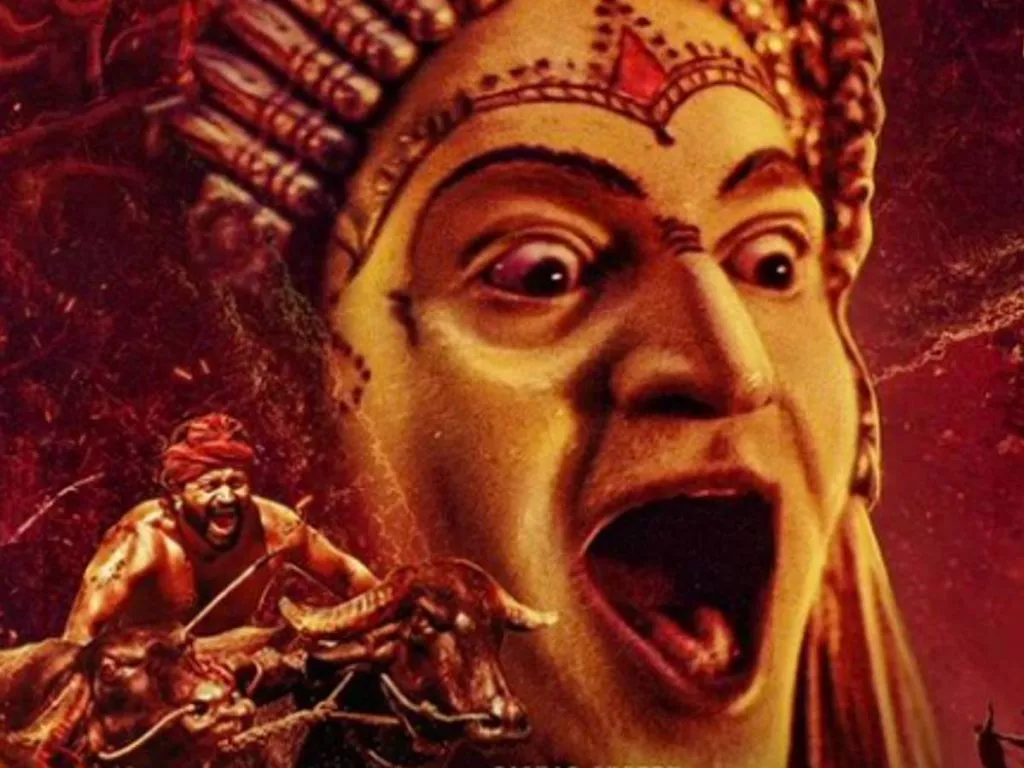
What’s it about?
South Karnataka. 1990. Shiva (Rishab Shetty) hails from a family of Bhoota Kola performers, a folk art form distinct to the Tulu region in Karnataka. He lives with his mother in their village, which is situated in a deep forest. Their village landlord Devendra (Achyuth Kumar) treats Shiva as his confidante and encourages his activities.
Despite his mother’s objections, Shiva frequently hunts wild boars.
Forest officer Murali (Kishore) imposes restrictions on the villagers, ordering them not to hunt the animals, drawing a line between their lands and the government’s, and insulting their rituals. Murali wants to protect the forest from encroachments, but he antagonizes the villagers with his rude act.
Shiva treats Murali as a villain and challenges him. Shiva firmly believes that the forest belongs to their tribe. But who tries to steal their lands from these people? When Shiva knows the truth, what does he do? How does their family’s tradition of Kola’s performance become his weapon?
Analysis
Films like ‘Kantara’ (the Telugu dubbed version of the Kannada film of the same name. Kantara means forest) cannot be easily termed as another revenge drama. The story has many layers, and the narrative marries the myth and masala movie elements quite well.
The film has three timelines – 1847, 1970, and 1990. It begins with a king’s story and how the forest lands were given to the tribal people. It tells that the king’s decedents have become greedy a century later. But the main story is set in 1990.
Is the forest belongs to tribal people or the original owners (feudal lords) or the government? The film raises this question with its encompassing narrative.
After setting drama brilliantly in the first act – the king’s story, the village issue, the buffalo races, etc, the story begins to go in the manner of Sukumar’s ‘Rangasthalam’. The setting, the villain, the hero’s relation with the villain, and the one twist in the story… all remind ‘Rangasthalm’. But it takes a dramatic turn after the end of the second act. The final act of the film is brilliant and mesmerizing. The final sequence takes the film completely to the next level.
The myth, the folklore, and the masala elements blend so well in this portion that it gives us an enriching experience. There is a tradition of Bhoota Kola in Karnataka, which is similar to Sigam in Bonalu Jathara. A person gives god’s speech. This element is mixed with the revenge theme so well.
The director presents the protagonist as a man who has a habit of hunting boars. But he frequently sees god in his dreams. Varaha Murthy comes into his dreams. He also sees Bhoota Kola roopam. These elements have blended well into the final sequence. The regular masala movie elements get a new touch with this mythic quality. No wonder, the film becomes an immersive experience.
Despite many issues of generic sequences and lousy sequences in the middle portion, the film becomes watchable because of its final sequence.
Rishab Shetty delivers a stunning performance in the final act. Among other actors, Achyuth Kumar as the villain and Kishore as the forest officer excel.
The cinematographer should be commended for his work. His cinematography is terrific. His capturing of the Bhoota Kola performance and the initial buffalo racing needs special mention. Ajaneesh’s background score is another attraction.
Bottom-line: ‘Kantara’ is a different masala drama. Despite some issues, the film gives a new experience with its stunning and riveting penultimate episode. The climax portion is terrific and makes a solid watch.
Rating: 3/5
By: Jalapathy Gudelli
Film: Kantara (Dub)
Cast: Rishab Shetty, Kishore, Achyuth Kumar, Sapthami Gowdaand others
Music: Ajaneesh Loknath
Director of Photography: Arvind S. Kashyap
Producer: Vijay Kiragandur
Written and directed by: Rishab Shetty
Release Date: Oct 15, 2022






